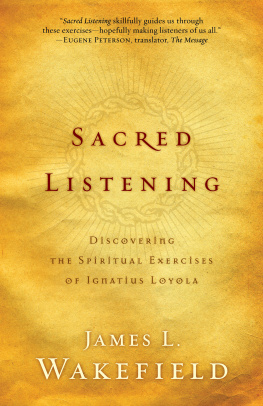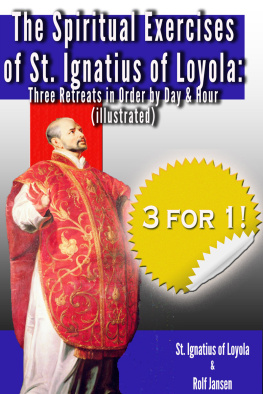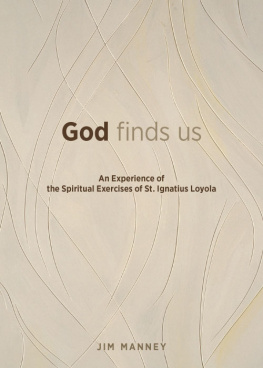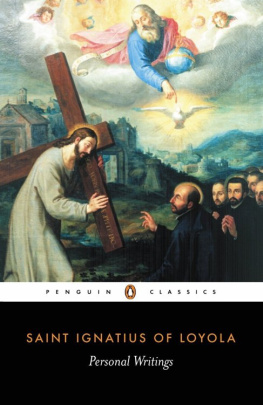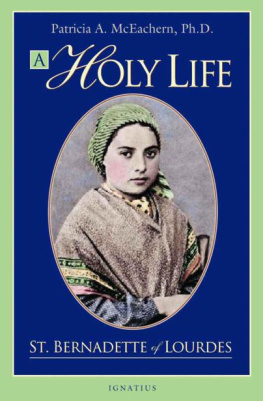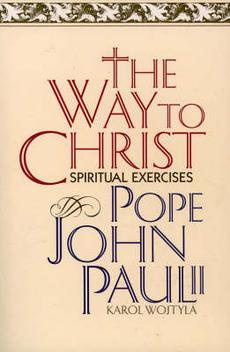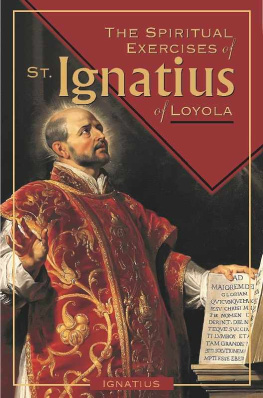
SAINT IGNATIUS OF LOYOLA
PERSONAL WRITINGS
IGNATIUS LOYOLA (14911556), youngest son in a noble Basque family, was trained as a page at the court of Castile. He was wounded at the siege of Pamplona (1521), and while convalescing underwent a deep conversion experience. He retired for a year of reflection to Manresa, the notes jotted at that time forming the basis of the influential Spiritual Exercises. After a hazardous pilgrimage to Jerusalem, he undertook prolonged studies (mainly in Paris), gradually attracting like-minded students. They took vows in 1534 and shortly afterwards formed what they called the Society of Jesus (popularly known as the Jesuits). From 1540, when Ignatius was elected Superior General, he lived in Rome organizing, largely through a series of Letters, the astonishing spread of the Jesuits. He was canonized (along with his disciple, Francis Xavier, and Teresa of Avila) in 1622.
JOSEPH A. MUNITIZ was born in Cardiff in 1931 of Basque parents and educated in Wales and England, before spending three years in Spain. His years of study as a Jesuit included spells in London, Oxford, Spain and Italy. After doctoral work in Paris, he joined the staff of the Corpus Christianorum, Louvain, and then returned to edit the Heythrop Journal in London. He served as Master of Campion Hall, 198998, and retired to become an Honorary Research Fellow of the Centre for Byzantine Studies at the University of Birmingham. He maintains his interest in Jesuit studies as Assistant Novice Master in Harborne (Birmingham).
PHILIP ENDEAN was born in 1954. He read English at Merton College, Oxford, before entering the Society of Jesus in 1977. During his training as a Jesuit he lived in Mexico, the USA, Germany and Austria as well as in the UK. He has worked as a hospital chaplain in Manchester and as a lecturer in theology as Heythrop College, University of London. He now teaches theology at the University of Oxford, and is editor of The Way, a journal of Christian spirituality published by the British Jesuits.
SAINT IGNATIUS OF LOYOLA Personal Writings
Reminiscences, Spiritual Diary, Select Letters
including the text of The Spiritual Exercises
Translated with Introductions and Notes by
JOSEPH A. MUNITIZ and PHILIP ENDEAN
PENGUIN BOOKS
PENGUIN BOOKS
Published by the Penguin Group
Penguin Books Ltd, 80 Strand, London WC2R 0RL, England
Penguin Group (USA) Inc., 375 Hudson Street, New York, New York 10014, USA
Penguin Books Australia Ltd, 250 Camberwell Road, Camberwell, Victoria 3124, Australia
Penguin Books Canada Ltd, 10 Alcorn Avenue, Toronto, Ontario, Canada M4V 3B2
Penguin Books India (P) Ltd, 11 Community Centre, Panchsheel Park, New Delhi 110 017, India
Penguin Group (NZ), cnr Airborne and Rosedale Roads, Albany, Auckland 1310, New Zealand
Penguin Books (South Africa) (Pry) Ltd, 24 Sturdee Avenue, Rosebank 2196, South Africa
Penguin Books Ltd, Registered Offices: 80 Strand, London WC2R 0RL, England
www.penguin.com
First published 1996
Reprinted with updates to Bibliography 2004
13
Translations, introductions and notes copyright Joseph A. Munitiz and Philip Endean, 1996, 2004
All rights reserved
The moral right of the translators has been asserted
Except in the United States of America, this book is sold subject to the condition that it shall not, by way of trade or otherwise, be lent, re-sold, hired out, or otherwise circulated without the publishers prior consent in any form of binding or cover other than that in which it is published and without a similar condition including this condition being imposed on the subsequent purchaser
EISBN: 9781101489536
Contents
Preface
Occasionally a writers influence is in indirect proportion to the size of his work: there can be few more decisive examples of this phenomenon than Ignatius Loyola. The only work of his to be published in his own lifetime was a Latin translation, made by a French colleague, of a very short handbook written in Spanish and bearing the title The Spiritual Exercises. Only 500 copies were printed and it is clear that Ignatius was extremely loath to distribute this book. Who in his day would have imagined that one day he would be included in the Penguin Classics series? To carry the paradox even further, the strongest advocate for the key importance of Ignatius as a writer has been not a member of the Society he founded, and not even a confessional believer in Christianity, but a sophisticated agnostic, the acute literary critic and pioneer in semiotics, Roland Barthes. He pointed out that Loyola shares with Sade and Fourier the distinction of being a logothete, one of the fondateurs de langues, and he analyses with great finesse the levels of language, the conceptual architectonics and the sensitivity to signs to be found in the Exercises.
One may be excused for thinking that Barthes founded his appreciation of Loyola simply on the Exercises. In reality he also had access to a French translation of the Spiritual Diary, and he mentions in passing the Autobiography. This recognition of the importance of Loyolas other writings, in particular of those writings in which he was personally committed, underlies the publication of the present collection of Personal Writings, which has been conceived primarily as a first-hand introduction to a remarkable man, whose influence in the development of spiritual awareness has been unique. The texts are chosen leaving to one side his other writings that enter self-consciously into the public domain: thus Ignatiuss major work, the Constitutions, the foundation document for the Society of Jesus, is not represented here and from his extant correspondence only a tiny proportion (as explained below), with the minimum of official documents, has been included.
This collection opens with the Reminiscences: some may wonder if this text, preserved in the memory of a disciple serving as a human dictaphone, strictly deserves to be accepted as a writing of Ignatius, but the force of his personality is certainly mirrored in these pages as Ignatius recounts his early life prior to his work as Superior General of the Society of Jesus. Next comes The Spiritual Diary, dating from 154445, with the Pros and Cons as a necessary preliminary. It is followed by forty Letters, each with its own short presentation and notes. In fourth place, and treated rather as an Appendix, the text of the Spiritual Exercises is printed once more.
The appeal of writings such as the last may have to remain something of an acquired taste. However, it will help if a sharp distinction is drawn between the main texts in this collection and that of the Spiritual Exercises (reproduced here as an indispensable background to all the other writings). The Exercises originated in the form of prayer notes, outlines of sequences of thoughts that had helped Ignatius as he reflected in silence before God. They take on meaning only in that sort of context. But the difficulty increases because these random notes were subsequently placed in a deliberate order, designed to foment a process (or dialectique as one outstanding French commentator called it The Personal Writings may well present us with something to admire; the Spiritual Exercises aim to help us discover how we might do otherwise.
Among those to be thanked for their help with this edition, William Those who have collaborated in the production of this book are mentioned in the introductions to the various sections, but a special word of thanks is due to Michael Ivens and Philip Endean, who were the most closely involved. Paul Keegan, the Advisory Editor of Penguin Classics, Michael Campbell-Johnston, former Provincial of the British Jesuits, and my Campion Hall community have all put me very much in their debt.


